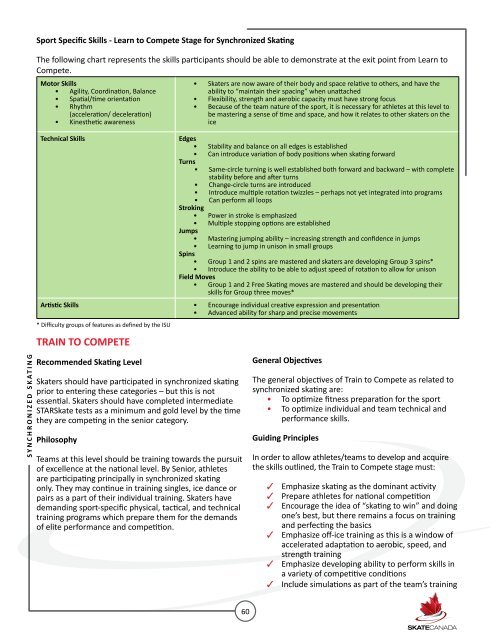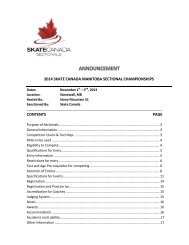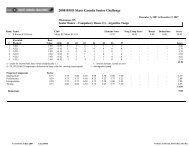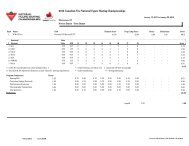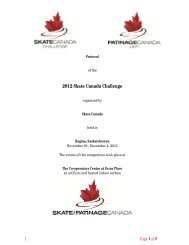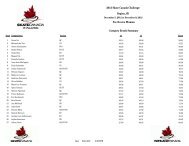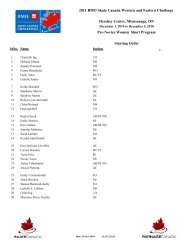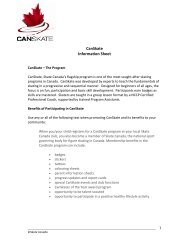LONG-TERM ATHLETE DEVELOPMENT - Skate Canada
LONG-TERM ATHLETE DEVELOPMENT - Skate Canada
LONG-TERM ATHLETE DEVELOPMENT - Skate Canada
Create successful ePaper yourself
Turn your PDF publications into a flip-book with our unique Google optimized e-Paper software.
S Y N C H R O N I Z E D S K A T I N G<br />
Sport Specific Skills - Learn to Compete Stage for Synchronized Skating<br />
The following chart represents the skills participants should be able to demonstrate 865 Sheord at the Road, exit point Ottawa, from Ontario Learn K1J 1H9 to<br />
Compete.<br />
Phone 613.747.1007 I Toll Free 1.888.747.2372 I Fax 613.748.5718 I Toll Free Fax 1.877.211.2372<br />
Motor Skills<br />
• <strong>Skate</strong>rs are now aware of their body and space relative to others, and have the<br />
• Agility, Coordination, Balance<br />
ability to “maintain their spacing” when unattached<br />
• Spatial/time orientation<br />
• Flexibility, strength and aerobic capacity must have strong focus<br />
• Rhythm<br />
• Because of the team nature of the sport, it is necessary for athletes at this level to<br />
(acceleration/ deceleration)<br />
be mastering a sense of time and space, and how it relates to other skaters on the<br />
• Kinesthetic awareness<br />
ice<br />
Technical Skills Edges<br />
• Stability and balance on all edges is established<br />
• Can introduce variation of body positions when skating forward<br />
Turns<br />
• Same-circle turning is well established both forward and backward – with complete<br />
stability before and after turns<br />
• Change-circle turns are introduced<br />
• Introduce multiple rotation twizzles – perhaps not yet integrated into programs<br />
• Can perform all loops<br />
Stroking<br />
• Power in stroke is emphasized<br />
• Multiple stopping options are established<br />
Jumps<br />
• Mastering jumping ability – increasing strength and confidence in jumps<br />
• Learning to jump in unison in small groups<br />
Spins<br />
• Group 1 and 2 spins are mastered and skaters are developing Group 3 spins*<br />
• Introduce the ability to be able to adjust speed of rotation to allow for unison<br />
Field Moves<br />
• Group 1 and 2 Free Skating moves are mastered and should be developing their<br />
skills for Group three moves*<br />
Artistic Skills • Encourage individual creative expression and presentation<br />
• Advanced ability for sharp and precise movements<br />
* Difficulty groups of features as defined by the ISU<br />
TRAIN TO COMPETE<br />
Recommended Skating Level<br />
<strong>Skate</strong>rs should have participated in synchronized skating<br />
prior to entering these categories – but this is not<br />
essential. <strong>Skate</strong>rs should have completed intermediate<br />
STAR<strong>Skate</strong> tests as a minimum and gold level by the time<br />
they are competing in the senior category.<br />
Philosophy<br />
Teams at this level should be training towards the pursuit<br />
of excellence at the national level. By Senior, athletes<br />
are participating principally in synchronized skating<br />
only. They may continue in training singles, ice dance or<br />
pairs as a part of their individual training. <strong>Skate</strong>rs have<br />
demanding sport-specific physical, tactical, and technical<br />
training programs which prepare them for the demands<br />
of elite performance and competition.<br />
60<br />
General Objectives<br />
The general objectives of Train to Compete as related to<br />
synchronized skating are:<br />
• To optimize fitness preparation for the sport<br />
• To optimize individual and team technical and<br />
performance skills.<br />
Guiding Principles<br />
In order to allow athletes/teams to develop and acquire<br />
the skills outlined, the Train to Compete stage must:<br />
3 Emphasize skating as the dominant activity<br />
3 Prepare athletes for national competition<br />
3 Encourage the idea of “skating to win” and doing<br />
one’s best, but there remains a focus on training<br />
and perfecting the basics<br />
3 Emphasize off-ice training as this is a window of<br />
accelerated adaptation to aerobic, speed, and<br />
strength training<br />
3 Emphasize developing ability to perform skills in<br />
a variety of competitive conditions<br />
3 Include simulations as part of the team’s training


